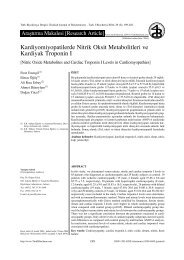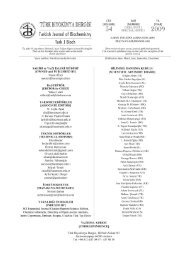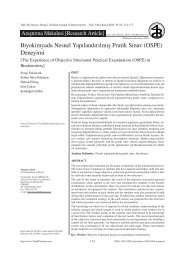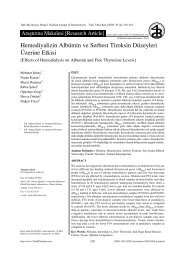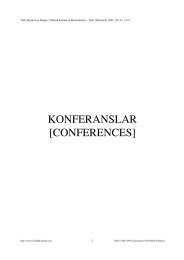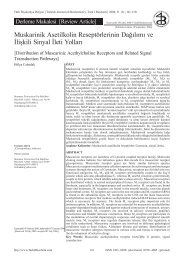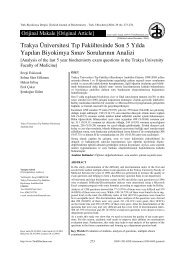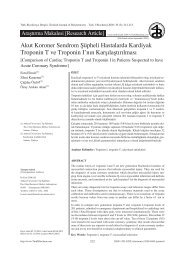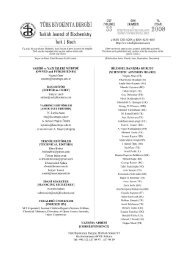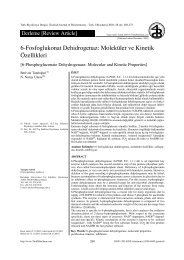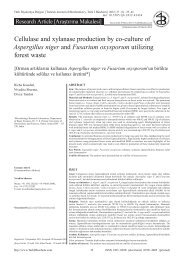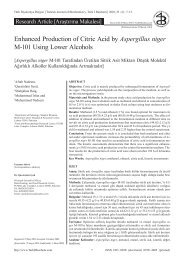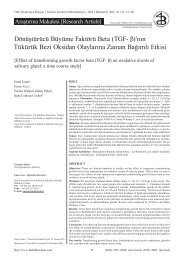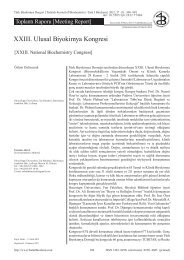24. Ulusal Biyokimya Kongresi - Türk Biyokimya Dergisi
24. Ulusal Biyokimya Kongresi - Türk Biyokimya Dergisi
24. Ulusal Biyokimya Kongresi - Türk Biyokimya Dergisi
- No tags were found...
You also want an ePaper? Increase the reach of your titles
YUMPU automatically turns print PDFs into web optimized ePapers that Google loves.
XXIV. ULUSAL B‹YOK‹MYA KONGRES‹<br />
25 - 28 Eylül 2012<br />
Dedeman Otel - Konya<br />
<strong>24.</strong> <strong>Ulusal</strong> <strong>Biyokimya</strong> <strong>Kongresi</strong>, Konya [24 th National Biochemistry Congress, Konya / TURKEY]<br />
İÇİNDEKİLER<br />
GENOTIP 1B KRONİK HEPATİT C’Lİ HASTALARDA IL28B<br />
POLİMORFİZMİ VE HCV KL‹RENS‹ İL‹ŞK‹S‹<br />
Hikmet AKKIZ<br />
Çukurova Üniversitesi, Tıp Fakültesi, İç Hastalıkları Ana Bilim Dalı, Adana<br />
THE ASSOCIATION BETWEEN IL28B POLYMORPHISM AND HCV<br />
CLEARANCE IN GENOTYPE 1B CHRONIC HEPATITIS C PATIENTS<br />
Hikmet AKKIZ<br />
Department of Internal Medicine, Cukurova University Medical Faculty, Adana<br />
CONTENTS<br />
DAVETLİ KONUŞMACI ÖZETLERİ<br />
Son 20 yılda , Karaciğer Yetmezliği ve karaciğer kanserine ilerleyebilen<br />
Genotip 1b kronik hepatit C’li hastalarda, hastalığın doğal seyrini değiştirmek<br />
amacıyla interferon-temelli tedavi rejimleri kullanılmaktadır (1,2). Günümüzde,<br />
HCV infeksiyonunun tedavisinde yeni bir döneme girmekteyiz. Virüsün yaşam<br />
döngüsünü doğrudan inhibe eden Direk Etkili Antiviral tedaviler uygulanmaktadır<br />
(3,4).<br />
Oldukça yakın bir dönemde, IFN-III kodlayan IL28B geninin 3 kb. proksimalinde<br />
lokalize rs12979860 C/T polimorfizminin HCV infeksiyonlu hem Avrupalı hem<br />
de Afrika-kökenli Amerikalı hastalarda yanıtı iki kat arttırdığı gösterilmiştir (5,6).<br />
Kalıcı virolojik yanıt, C/C genotipli Avrupalı hastalarda yaklaşım%80 iken, T/T<br />
genotipli Avrupalı hastalarda kalıcı virolojik yanıt %30 dolayında bulunmuştur<br />
(6).<br />
Gerek primer insan hepatositlerinde gerekse şempanzelerde, kullanılan infeksiyon<br />
modellerinden sağlanan yeni veriler,tip III IFN’unun HCV infeksiyonuna yanıtta<br />
önemli bir role sahip olduğu düşüncesini desteklemektedir (7). Eksojen tip III<br />
IFN tolerabl olmasına ve tedavide antiviral etkiye sahip olmasına rağmen tip III<br />
IFN’nun önemli antiviral etkisi ya doğal immüniteyi değiştirerek ya da adaptive<br />
immune system üzerinden olmaktadır (8).<br />
Klirens, T-hücre spesifik yanıtına ve anti-HCV antikorlarına bağlı olmamasına<br />
rağmen, adaptiv immune sistem HCV infeksiyonunda ve klirensinde önemli bir<br />
rol oynamaktadır (8). Sitokinler bu sistemler arasında fonksiyonel bir köprüdür<br />
(9). Sitokinler, CXCL-10 (veya IP-10), hücre-virüs etkileşiminde ve kalıcı<br />
virolojik yanıtta potansiyel bir biyomarker olarak etki edebilir (10). Doğal<br />
öldürücü hücre aktivasyonunda IL28B genotip – temelli farklılıklar açıktır. Bu,<br />
HCV infeksiyonunda ve klirensinde doğal ve adaptive immune sistem arasında<br />
bir diğer önemli fonksiyonel köprüdür (10).<br />
In the last two decades, interferon-based therapeutic regimens have been used to<br />
treat chronic hepatitis C with the aim to alter the natural history of this disease,<br />
which can lead to liver failure and hepatocellular carcinoma (HCC) (1,2). We<br />
have now entered a new era in HCV therapeutics. Direct acting antiviral (DAA)<br />
therapies directly inhibit specific steps in the HCV viral life cycle (3,4).<br />
Very recently, the rs12979860 C/T polymorphism, located 3 kilo-bases upstream<br />
of the interleukin 28B (IL28B) gene, which encodes for type III IFN, was shown<br />
to be strongly associated with more than a twofold difference in response to<br />
HCV treatment, both in patients of European ancestry and in African – American<br />
(5,6). Following antiviral treatment, European patients carrying the C/C genotype<br />
achieved a sustained response (SVR) in approximately 80% of the cases, in<br />
comparison to approximately 30% obtained by those who carried the T/T genotype<br />
(5).<br />
Recent date using models of infection in both primary human hepatocytes and<br />
chimpanzees support an important role for type III IFN in response to HCV<br />
(7). Although exogenous type III IFN is tolerable and has antiviral efficacy as<br />
a treatment, a significant functional role for type III IFN may be indirect, either<br />
through altering innate responses or through the adaptive immune system (8).<br />
The adaptive immune system plays an important role in HCV infection and<br />
clearance, although clearance is not dependent on T-cell-specific responses and<br />
anti-HCV antibody (9). Cytokines are a functional bridge between these systems,<br />
and cytokines such as CXCL-10 (or IP-10) may potentially act as more direct<br />
serum biomarkers of host-viral interacting and SVR prediction (10). IL28B<br />
genotype-based differences are apparent in natural killer cell activation, another<br />
important functional bridge between adaptive and innate immune system response<br />
in HCV infection and clearance (10).<br />
REFERENCES<br />
1 – Bruno S, Facciotto C. The natural course of HCV infection and the need for<br />
treatment. Ann Hepatol 2008;7:114-119.<br />
2 – Thio CL, Thomas DL,Carrington M. Chronic viral hepatitis and the human<br />
genome. Hepatology 2000;31:819-827.<br />
3 – Ge D, Fellay I, Thompson AJ. Genetic variation in IL28B predicts hepatitis C<br />
ABSTRACTS OF INVITED LECTURES<br />
Turk J Biochem, 2012; 37 (S1)<br />
http://www.TurkJBiochem.com



